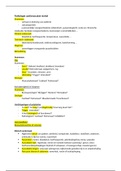European and Comparative
Company Law and Corporate
Governance
2023-2024
Anna Sonnenschein
,CompanyEuropean
law in Europe and European company law
and Comparative Company Law and Corporate Governance | Anna Sonnenschein
A brief overview of some main features, also compared to US corporate law
What we will see In this topic
→ The important feature of CompL in European country compared to the different approaches in the US
→ The influence of European CompL
1. Company law vocabulary in English
Vary basic BUT nevertheless important!
Companies: We have to be aware that when we talk about companies and corporation, those words have a
slight different connotation in the UK, in the US or even in Germany as opposed to in Belgium
→ We are usually the word company in a broader sense that what it is used by an English lawyer.
Company = partnerships and corporations (in Belgium)
Partnerships: companies with no limited liability of shareholders; closed (intuitu personae)
→ The partners run the firm (=function as directors)
Corporation: word which is used by people all over the word BUT for the American it is used to indicate entities
with legal personality, limited liability, transferable shares (hence: “public”) and delegated management
→ Could be used for what we call public company on the EU continent
Public company: the shares are freely transferable (they can be bought and sold to whoever you want)
→ The shares are traded on the stock exchange
→ NV, SA, AG type
Private company: the shares are not freely transferable
→ BV, sarl, GmbH type
So there is a slight difference of words used by the EU continent and the native English speakers
2. Corporate governance
>More than half the course will be devotes to corporate governance issues
= about agency conflicts between stakeholders
→ Agency conflicts: when stakeholders want to work together within a firm but have conflicting interests
and (risk) preferences
o You have various stakeholders’ groups who all want to work together and turn the firm into a
success BUT at the same time they all have conflicting interest
o Studying corporate government = studying those agency conflict
Corporate law is about 2 things:
→ providing an organisational blueprint; largely enabling law
→ mitigating agency conflicts, largely through mandatory, “paternalistic” law
we can see 3 types of Agency conflicts
→ Type I: shareholders vs managers
o Managers runs company on the day-to-day basis and take the strategic and other decision.
▪ BUT they are supposed to take those decisions in the interest of the shareholder BUT
they may have a tendency to pursue their own interest
1
, European and Comparative Company Law and Corporate Governance | Anna Sonnenschein
→ Type II: minority vs controlling shareholders
o The interest of small investor (people like you and me or institutional investor who only own 2
or 3% of the company) diverge very often form those of the shareholder
o Because controlling shareholder are often extracting benefits from the company
o Very commune in the US
→ Type III: the firm versus external stakeholders: employees, creditors, “affected communities”
The study of corporate governance = study of those 3 types of agencies
→ We as lawyers we look at how legal rules influences the development of those agency conflict and how
law awards power to those various parties and how law can mitigate those conflicts
3. Varieties of capitalism: EU-US-Asia-…
If we compare how firm function compared to the US and to Asia, we can see many differences with corporate
law and firms as they evolve on each of those “3 continents”
◊ Different balance between various stakeholders in practice
→ Shareholders v managers
→ Shareholders v workers
→ Different types of shareholders: controlling v. minority or pure investor
◊ Different role of the state
→ The government plays a different role
◊ Different and evolving views on what corporations are for
→ In the US, firms are still funded in a different way
◊ Differences in sources of funding: debt v equity; capital markets v banks and private placements
Law reflects this (eg different powers for board and GM in US vs EU) and influences this
3.1. Features of company law in Europe
>this really is an introduction
If you look at companies act, and you compare Delaware (the general corpora law act) to corporate law at the
EU level you will see that EU thinks that one of its functions is to protect not only the shareholder BUT also of
creditors
→ In the Delaware company act, you will find no rule that is helpful for the protection of creditors
→ Ex: if a Delaware corporation in 2022 makes a loss of 10M and in 2023 it makes an operating profit of
15M than if you take those 2 years together, we have a profit of 5M
o BUT it can forget about the loss of 2022 and just look at the 15M
o BUT in the EU, you cannot do that: company who made such a loss and gain, in the EU view, can
only distribute by its shareholder 5M (we look at the full picture)
▪ That is a mandatory rule for us for this limitation of dividend distribution: you have to
compensate the losses of the past with the profit
o We protect the creditor here because you can only take 5M from the company and give it to the
shareholder
o This protection is no doubt partially explained by the importance of banks as funders
→ US legislator does not think that the role of law is to protect other person than the shareholders
2
, European and Comparative Company Law and Corporate Governance | Anna Sonnenschein
In certain EU country, company law contains disposition in order to protect the employee
→ Ex: in Germany and in the Netherlands
→ You have a lot of codetermination at a board level
o In Germany you have rule that say that company need dual board and depending on the size of
the company, the supervisory board must be chosen by the employees
→ But we can see huge differences between the members states
In short:
→ US: evolution from manager-focused to shareholder-investor model
→ EU: has never had focus on only one stakeholder group
Then State has always been more important in the EU than in US but less so than in China
3.2. Ownership structure
If we look at large firm, companies should have a free flow
→ The share can be freely bought and sold, and it is not like there is a shareholder who has 20 or 30% and
who wants to keep that for himself
Traditionally, in the 1990, it was said that one of the diff between the US and the EU is that US has way more
dispersed shareholder (Dispersed ownership refers to many shareholders with none having the ability to exercise
power over the corporation individually) whereas companies in EU and Asia do have concentrated shareholder
(refers to individuals or controlling shareholders with the ability to exercise power over the company)
→ It is partially true, BUT is requires a more fin-grained analysis
o UK but also Japan and Switzerland have clearly more dispersed ownership than rest of world,
including US
o In the US, there are many major corporations with family/concentrated ownership
o Some EU jurisdictions see clear trend towards more dispersed ownership
Now we see it both in Europe and US, BUT it stays more pronounced in the US:
→ Today, many US companies also have big shareholder who hold 20-30%
→ “common ownership”: large asset managers (Blackrock, Vanguard, …) are largest shareholders in “the
whole economy”
BUT is stays a big differences!
3.3. Differences in economic and institutional background
Another big difference, is that company where traditionally funded in a different way
→ This difference is still there BUT…
Traditionally, large firms in Europe, where funded through banks whereas in the US, the funding through the
stock market was more important
→ Stock market shave traditionally have been far more important in the funding of US firm than EU
→ BUT that has changed during the past 20 years
o Bonds (obligations) are now almost as important in Europe as in the US
o In the past 10 years, we see a steep decline in the US of the number of firms who become public
(which was a strong tradition in Europe)
▪ drop of 50% in number of listed companies and IPOs in US 1996-2016
=> it very likely explains the importance of creditor protection as a goal in corporate law in Europe, first and
foremost Germany, which exported its model (with British help) to rest of EU
=> very likely explains conservative approach of accounting law in EU (EU GAAP), until the switch to IFRS
3
, European and Comparative Company Law and Corporate Governance | Anna Sonnenschein
Shareholder model
Traditional, it was said that in the US, until the mid-90s, the whole of corporate law in the US was manager
focus: it was geared towards increasing the power of managers and toward the interests of management and
“director primacy”
→ = concentrating power in hands of managers and directors
BUT afterwards, in the US, corporate governance practice began to change toward a shareholder primacy
→ the de facto duty of directors has been to shareholders only (before insolvency)
→ This has been an evolution
→ The US has moved from a director primacy (the board called the shots) may be being eclipsed by
shareholder primacy under the influence of shareholder activism (the shareholder take the decision)
Traditionally it was said that EU law gave more power to the shareholder that US one did
→ BUT as some people have argued, even though EU corporate low did indeed award more legal power to
shareholders in EU that in the US (EU had thus less managers centered corporate law) BUT if you look at
how the law operated in practice, the shareholder where not so protected by the law
3.4. Division of powers board/GM
Even today, if you look at the division of legal power between the board and the SH between various law, we
can see that SH have more legal decision-making power than in the US
In many legal systems (including US), the board has residual powers
→ The board can take any decisions that are not reserved by law by the general meeting of Shareholder or
other bodies of the department
Europe: articles need to contain rules on legal capital and shares
One of the differences is also that if you want additional share in EU you need permission from the shareholders
and thus to make a general meeting
→ We do have this technique of “authorized capital”: the GM can for a certain period of time authorize
capital and a specific number of additional share
→ Difference between authorized and issued stock does not exist
More generally, these rules in the US have been harmonized.
Company in EU cannot buy back their own shares without approval from the GM (>< US : the shareholder just
have to agree)
→ Share buyback = it is the company buying share that are hold by the shareholder
o WHY:
▪ most common reason: it is cheaper to transfer money this way!
• the money will be transferred from the company to the shareholder BUT this
transfer of money will be taxed at a lower rate than when you distribute a
dividend for example
▪ to support the stock price to make sure that it does not go to low
▪ a way of rewarding your shareholder by offering them a price for their share (there will
be a higher value per share if we destroy the share that have just been bought)
▪ the company needs share to award to managers share-options (contract between the
CEO (ex) and the company where he/she can buy share from the company at the price
that is determined today BUT this person can only buy in the future at the price that is
determines today)
o share buyback is highly ruled because it could unbalance the balance present in the company
All kind of transaction that affect the number of outstanding shares need to be approved by general meetings
whereas in the US the board has way more legal power
4
, European and Comparative Company Law and Corporate Governance | Anna Sonnenschein
Mergers, divisions, carve-outs
Broadly speaking, when two firms/companies want to merge in EU, it always requires a GM by the shareholder
→ In the US, the board can decides on carve-outs
Conclusion: the board has more legal power in the US
3.5. Anti-dilution rights
Both jurisdictions protect shareholders through directors’ duties concerning price setting for new shares
Pre-emption right: a right of existing shareholders in a corporation to purchase newly issued stock before it is
offered to others (you are entitled to buy new share is you want to)
→ This is mandatory as a result of an EU directive
→ Highly valued by institutional investor
→ Can only be excluded on case-by-case basis with supermajority at GM
>< Delaware: no preemptive rights except when articles provide for them (mostly not)
→ It has been abolished in the 30s
→ They can, BUT they are not obligated to do so (it is rather seen as a gift that the company gives to you)
US : the dividend distributions are a prerogative of the board
EU: either GM or supervisory board, but mostly GM
The board system :
It is different around the world, even in Europe.
In dual board structures, shareholders only elect supervisory board, and that board appoints top management
(=executive directors)
In some dual board systems, part of supervisory board is elected by employees, not shareholders
→ may be desirable or not, but is certainly less shareholder friendly
→ Is very effective against hostile takeovers: employee-selected directors cannot be dismissed by general
meeting
3.6. Goals of corporate law
EU: there is a duty to all stakeholders
→ Even in UK
Delaware: there is a requirement to promote stockholder welfare
→ Grants that many states allow- but do not require- board to take other constituencies into account
→ But large majority of corporations are incorporated where no such possibility exists
4. ESG, sustainability, companies and human rights
Both in the US and in EU, we see that firms are engaging since 2016, and beginning to ask “what is our purpose”
→ We see after the financial crisis (2007-2009) and also because of the climate crisis a world-wide focus
on the role of corporations in sustainability and fighting climate change
→ Capitalism is changing (as part of the change in culture) and the idea that dominated during the 90s that
company are there for this main purpose to enrich their shareholder is increasingly being questioned
→ => world- wide corporate purpose debate
The debate is reflected in the part of the broader debate about the fact that company should devote more
attention to “ESG” (environmental, social governance issues)
→ One special concrete consequence of these ESG debate which revolves about the role of companies in
society and whether their moral duty to limit their impact should be turned into a legal duty
5
, European and Comparative Company Law and Corporate Governance | Anna Sonnenschein
There is a renewed interest in the question whether “social enterprises” need separate, enabling regulation and
separate legal forms
4.1. Corporate purpose debate
Should companies focus on maximising profits for shareholders
→ As was the culturally undisputed goal during the heyday of “shareholder value, approx. 1990-2008
Or should they strive to reconcile “profits, people and planet” ?
→ Or even have an ulterior purpose ?
→ Some: distinguish between “regular companies” and “purpose vehicles”, like the French “société à
mission”
=> debate about social enterprise
4.2. Sustainability/human rights Due diligence
Conviction that multinational businesses from Europe should make sure that their subsidiaries but also
suppliers, world-wide, respect human rights and do not create “adverse impacts” on environment
→ This is a UN guiding principles on Business and human rights (= soft law)
→ It was “implemented” through OECD guidelines about due diligence
France (2017) had adopted the mandatory due diligence obligation for large firms
→ 2023: Germany follows suit
2024: it is very likely that the EU expected will adopt the directive called CSDDD (CStripleD): this will force all
large EU companies and non-EU with large EU turnover to adopt due diligence practices in their value chains:
→ Assessing risks of adverse impacts
o Ex : VW will have to report that their batteries comes from Africa where HR are not always
respected…
→ Developing policies to mitigate those risks
o To make sure that workers are treated in a decent way
o If it is not possible, the firm will have to terminate the business with these other firms
→ Implementing them
→ Tracking problems
→ Reporting on implementation and problems
→ Offering redress, doing something about adverse impacts
The EU directive is just a draft BUT we already have legislations in France and Germany
Note : non European firm will also be under the obligation of this directive!
→ In regard to their turnover in EU
=>Illustration of what is the hot topic in EU company law at the moment
6







